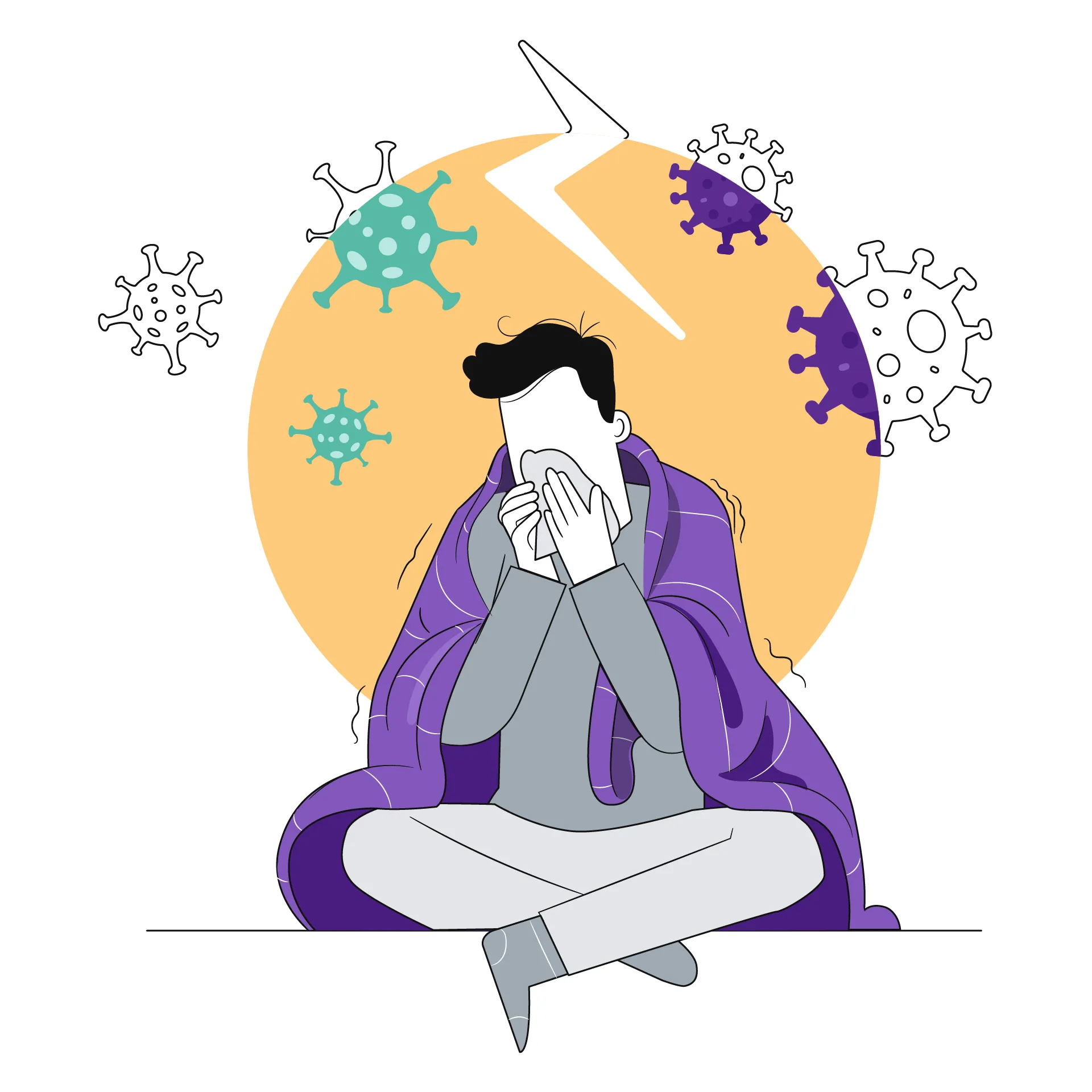Covid | 4 min read
COVID-19 vs Flu: 8 Similarities and Differences Between them
Medically reviewed by
Table of Content
Key Takeaways
- To get over the COVID-19 vs flu confusion, learn unique facts about both
- One of the similarities between COVID-19 and flu are that they both affect lungs
- However, COVID-19 may cause more serious complications than flu
COVID -19 has created havoc around the globe. Despite vaccination drives all over the world, still there are challenges in eliminating this deadly virus. You may often get confused between COVID-19 and flu because they are quite alike in nature. Read to know more about COVID-19 vs Flu.
Some of the similarities between COVID-19 and flu are that both of these are respiratory diseases that spread in a similar way and share certain symptoms [1]. However, despite all likeness, the viruses responsible for these two diseases are different. COVID-19 is caused by the SARS-CoV-2 virus first found in the year 2019. There are certain mutations of coronavirus that include delta and omicron virus. Flu is caused by the influenza virus which is of two types, A and B.
Are you wondering what is florona or whether you can get diagnosed with both COVID-19 and flu at the same time? Florona is a double infection where a person gets infected simultaneously with both COVID-19 and flu [2]. It is not a variant of COVID-19 and should not be confused with the delta or omicron virus. To better understand the difference between COVID-19 and flu, read on.
Additional Read: What is Florona?
COVID-19 vs flu risk symptoms
Both COVID-19 and flu share similar symptoms including cough, fever, and body aches. The symptoms in both can be mild or severe. In some cases, there may be no symptoms at all. Also, both of these illnesses can cause pneumonia.
Here is a list of some symptoms shared by COVID-19 and flu:
- Fever
- Chills
- Headache
- Vomiting
- Diarrhea
- Sore throat
- Runny nose
- Loss of taste
- Fatigue or tiredness
- Breathing difficulties
- Body and muscle ache
The symptoms in both illnesses start after 1 or more days from the time of getting infected. However, symptoms in COVID-19 may appear late when compared to the flu. If you are infected with flu, you may observe symptoms after 1 to 4 days of infection. Symptoms in the case of COVID-19 may appear after 2 to 14 days from infection.
COVID-19 vs flu risk factors
As far as the risk factors are concerned, there are similarities between COVID-19 and flu. For instance, seniors with underlying medical conditions or pregnant women are at more risk of developing both these diseases. However, COVID-19 may cause more severe complications than flu.

COVID-19 vs flu prevention
COVID-19 and flu can be effectively prevented through vaccination in most cases. You can also follow some protective measures to protect yourself. Here are some standard precautions.
- Maintain social distancing and avoid going to public places, especially if you are unwell
- Keep your home well-ventilated
- Wear a face mask in public places to reduce the chances of contracting COVID-19
- Cover your mouth and nose when you cough or sneeze
- Do not touch your eyes, nose, and mouth unnecessarily
- Disinfect surfaces like switches, doorknobs, and counters
- Wash your hands with soap and water or use a hand sanitizer
- Connect with your doctor if you start experiencing any COVID-19 or flu symptoms
Ensure that you get yourself vaccinated against COVID-19 to protect yourself and those around you from this deadly disease and you can download cowin certificate online. You can also get an annual flu vaccine.
COVID-19 and flu treatment
A person hospitalized due to flu or COVID-19 should get proper medical care to avoid further complications and relieve the symptoms.
Flu: For people infected with flu, doctors prescribe influenza drugs or medicines. If a patient suffering from flu is hospitalized and is at risk of complications, doctors may recommend antiviral drugs.
COVID-19: Remdesivir and Tocilizumab are the two medications that the Indian government panel has approved for use. Research is still ongoing to find out more inclusive treatment options for it.
Additional Read: Kidney Disease & COVID-19If not treated, COVID-19 can lead to further complications. Reports have linked kidney disease and COVID-19 too as people infected with coronavirus are at higher risk of developing acute kidney injury [3]. Having flu also exposes you to other diseases including COVID-19. So, as the COVID-19 vs flu research goes on, make sure to get treated if you have any relevant symptoms. To make this easier on yourself, you can book an online doctor consultation on Bajaj Finserv Health. Contact the best doctors and medical experts on the platform and get all your health issues addressed!
References
- https://www.who.int/emergencies/diseases/novel-coronavirus-2019/question-and-answers-hub/coronavirus-disease-covid-19-similarities-and-differences-with-influenza
- https://economictimes.indiatimes.com/news/web-stories/what-is-florona-is-it-dangerous/slideshow/88713511.cms
- https://www.kidney.org/coronavirus/kidney-disease-covid-19
Disclaimer
Please note that this article is solely meant for informational purposes and Bajaj Finserv Health Limited (“BFHL”) does not shoulder any responsibility of the views/advice/information expressed/given by the writer/reviewer/originator. This article should not be considered as a substitute for any medical advice, diagnosis or treatment. Always consult with your trusted physician/qualified healthcare professional to evaluate your medical condition. The above article has been reviewed by a qualified doctor and BFHL is not responsible for any damages for any information or services provided by any third party.




